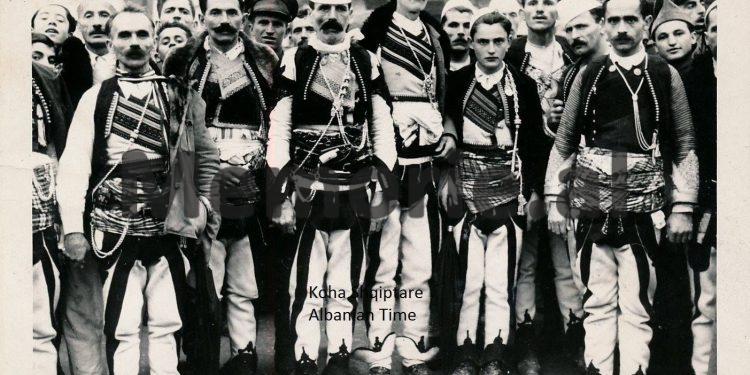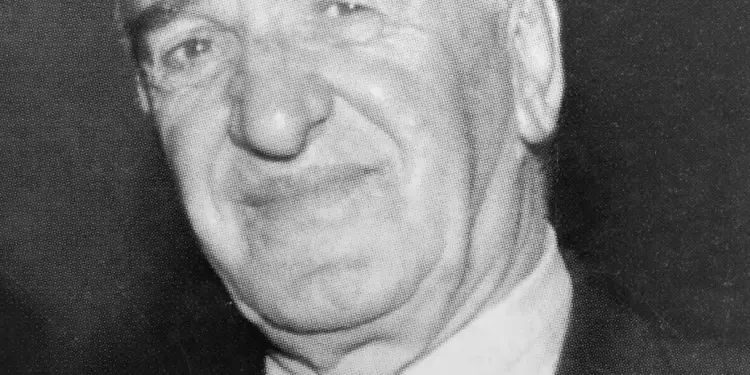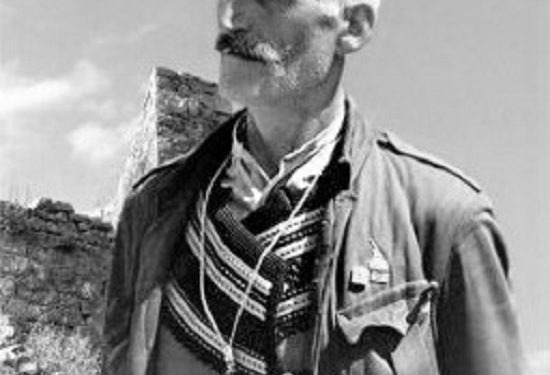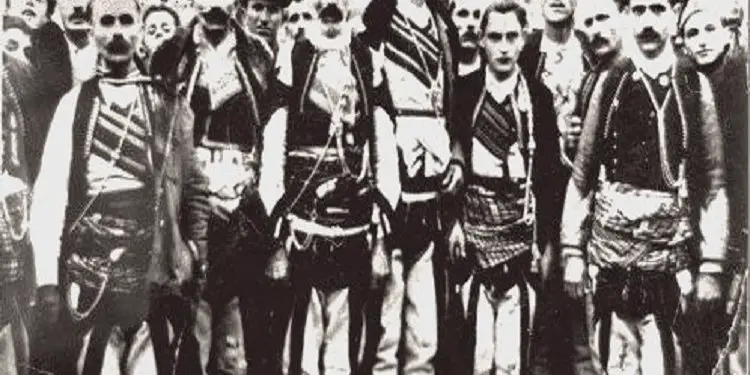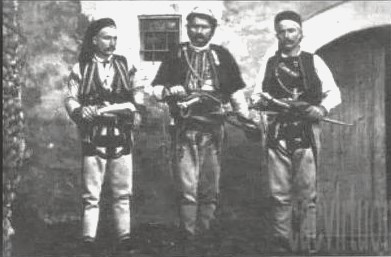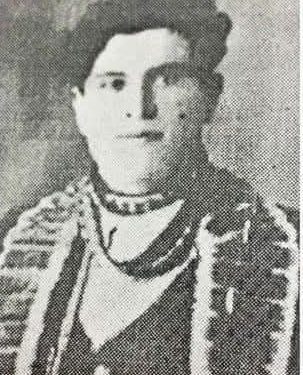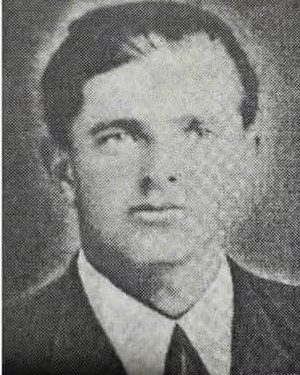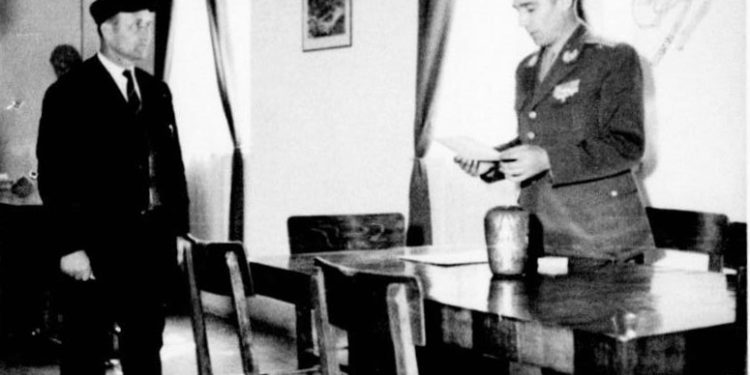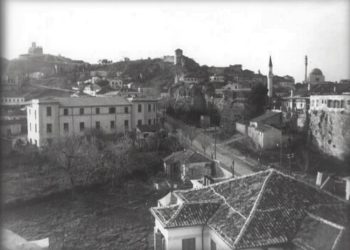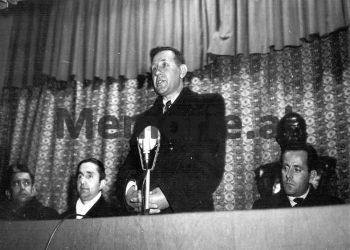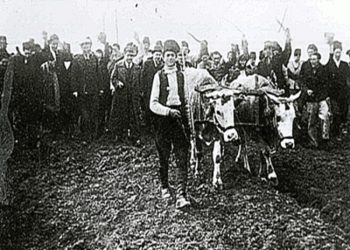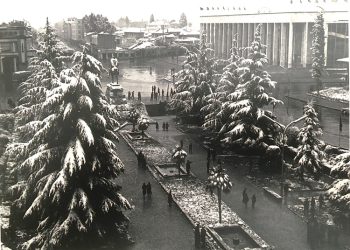By Ahmet Bushati
Part Nine
Memorie.al/After the flag was altered in 1944 with the addition of the communist star, Shkodra transformed into a center of resistance against the regime, paying a high price for its tradition of freedom. By April 1945, high school students, already feeling betrayed by the promises of the war, gathered to oppose the new terror that imprisoned and killed innocent people. Communism turned Kosovo into a province of Yugoslavia, while Shkodra was punished for its “historical crime”- its defiance against invaders. The “Postriba Movement” became a tool to suppress all dissent, plunging the city into an unprecedented spiral of suffering: imprisonments, executions, and the destruction of families. The high school students, alongside citizens, became symbols of resistance, while some “young communists” turned into tools of the State Security, leading to expulsions, imprisonments, and internments.
Four times, Shkodra rose in armed rebellion, but history forgot these battles. This book is written to remember the countless prisoners, the tortured, the killed, and the parents who suffered in silence. It is a warning against dictatorship and a plea for future generations not to forget the sacrifices made for freedom.
Continued from the previous issue
In the Footsteps of a Diary
Shkodra in the first years under communism
Back in Vukel, they shot Dedë Fran Braci, Ujk Nikë Mirashi, Ndue Nikë Staka and Zef Lul Mirashi, and with them, Gjergj Ndue Mirashi from Tamara and Gjon Loc Pëllumbi from Nikçi. But what else was left for the barbaric partisans to do?! Yes, they had to do something that had never happened before on Albanian soil: to cut the throat, “like a Slav”, that is, alive and bring them face to face with their comrades, the young men in question, such as Nikë Lucë Bajraktari, the son of Lucë Bajraktari who was shot, and Llesh Fran Braci, the brother of Dedë Fran Braci, also shot.
The savagery and disfigurement of those partisans, as Albanians and as people, would know no bounds. The Albanians were historically mentioned as the only people in the entire Byzantine Empire who treated their victims humanely, a trait that would endure to this day, but not by those partisans who came from the south, which were filled with the murder of their innocent brothers. Those partisans would be the first Albanians, who, after adopting the cruelest methods of their Slavic tutors, would mistreat their victims, even though they were of the same blood, torturing them to death like no enemy, sometimes even mocking them for no reason.
Since the mountain forces had dispersed, Preng Cali, – at that time seventy-eight years old – had holed himself up inside a cave in Vukël. It was customary in those times that in cases of misfortune and danger to a friend, especially a leader, friends and relatives would be found near him and share his fate. Thus, with Prenk Cali, fourteen young men and boys were isolated on that occasion, among whom – as we have already mentioned – and a girl named Tone, who had a brother, Gjelosh.
From Vukli, the brothers Ndue and Zef Rapuka, as well as the brother who had also been shot a few days earlier, Lucë and Gjon Rapuka, were there. With them was their nephew, now an orphan, seventeen-year-old Maçi. There was Fran Dashi with his son, Dodë, as well as Marka Vuksani with his son Pal and his brother Ndue. There was also the body-guard of Dede Gjon Deda, with whose torture some partisans would take him all night in Rapshë i Hotit, until he gave up his soul in their hands.
From Nikçi, Fran Zef Pllumbi, Kolë Preng Pllumbi and the youngest of all, Prelë Tomë Pëllumbi would join them. With them, as we have mentioned above, was the daughter of the executed Katrina Tomë, Tonia, who, although young, had decided not to marry. She dressed like a man with a çakçir and xhamada, wore the white hat of the Malsori on her head, and was invited to weddings and other occasions of joy, among friends and relatives of the house, because she sang, danced and played the fiddle, like no other. As very skillful and brave as she was, there was a place for her even in the men’s cave. Next to her, as always, was her brother, Gjeloshi.
The repeated offer to surrender was rejected with contempt by the cave’s prisoners for several days, but when on the eighth day their ammunition and food were running out, Prenk Cali himself, as he had thought for a long time, made a decision, which he made known to his brave men with these words: “I know that the communists, although they swear allegiance, do not keep their allegiance. I know very well that they will destroy me, but I want you too, since you are also young.”
That same day, sent by the partisans, Brother David Pici and the mountaineer from Selce, Gjon Caka, arrived at the cave, who said: “Some of you are punished, but most are forgiven.” The last to arrive at the cave were the notorious Zoi Themeli and Sulë Domi from Mat, brigade commander, from whom Preng Cali asked for guarantees for three conditions that he had set: first, that the young men be released, because they were innocent; second, that those who were to be held should not be handed over to the army, that is, that the partisans should not mistreat them; and third, he said, we men are ready to stand trial.
Zoi Themeli and Sulë Domi would swear and re-swear a hundred times on the “flag” and “the Albanian oath”, assuring Preng Cali that the conditions he had set would be respected to the end. But what really happened? As soon as the prisoners emerged from the cave, the communist treachery would immediately reveal itself: they tied them with wire and tied them together with ropes, setting them on fire.
After a difficult and somewhat humiliating journey, night fell on them in Rapshë i Hotit, where they were stopped. It was that night, as we have shown above, when the partisans were going to strangle Dedë Gjon Dedë to death and, like cattle, cut the throats of the young Nikë Lucë Bajraktari and Llesh Fran Braci.
The next day, the others got into a car and drove them to Shkodra and, as usual in such cases, at the entrance to the city, they got out of the car, only to find themselves instantly under the most unbearable screams of an organized crowd of people, who would reach up to the waists of those unfortunate people, shouting at the top of their voices: “Vengeance, vengeance”, “Bullet to the forehead, bullet to the forehead”! etc. threats and insults, which those wise and brave mountaineers would be forced to face without pride and with great spiritual suffering.
“Deka, gold cap”, one of them would tell us, years later in prison, when he painfully recalled that incident. In order to demoralize those mountaineers and to make the people themselves fear them, they would force them to walk all the way that day, to the prison called “Gestapo Prison”, located somewhere to the right of the road that leads from the “Serreq” neighborhood to “Perash”.
But did Kelmendi’s drama end there?! No, not at all!
It would continue like the ruins and misery that come as a result of an earthquake that struck a little earlier. Of course, within such a work, there is no room for many of those events that occurred. The drama of Kelmendi, as a summary of the dramas of his many, many families, cannot be reflected in all its truthfulness and in its dimensions of suffering and pain, without having described in particular, the drama of at least some of his families.
As an illustration, we are taking only the family of the Dedaj brothers, whose three sons were killed one after the other on that occasion, and of course without having this being the most tragic case for a Kelmendi house at that time. Brothers Gjergj, Dedë and Nikë Gjon Deda, a few years earlier, had left their ancestral lands in Nikç and gone to Guci, in search of a better life, where they had bought a piece of land and built a new house. Upon hearing that their Kelmendi had joined the war with the communists, the three of them had run, to be found as soon as possible alongside their Kelmendi brothers.
Ultimately, Gjergji would be the one who had been strangled to death in Rapshë i Hotit, Deda who had been killed in an attempt on a partisan patrol somewhere beyond Tamara, while Nika, after suffering for several days from the wounds received in the fighting at Tamara and, in the solitude of a cave in Vermoshi where he had been hiding, had been captured one day by partisan forces, who had immediately handed him over to the Montenegrins, and the latter, by court, had sentenced him to death.
Milka Plashin, a communist with a position of influence in Montenegro, who had known and appreciated Nika and his brother from an early age, had intervened and worked to secure his release from prison. Other Montenegrins, dissatisfied with the support that an Albanian was giving him, would assassinate him a few days later.
The brave Gjekë Selca and Gjergi Lula, both from Selce, who grew up together as brothers, and who had both distinguished themselves in the battles of Tamara, would also fall victim to communist treachery. They had surrendered, not trusting the publicly announced amnesty, but the trust that Abas Fejzo, the brigade commander, had given them himself. As in other cases, as soon as they had surrendered, they were handcuffed, and for several days they would remain locked up in a prison in Shkodra.
At the end of the three months, on a beautiful April day, they would be taken out to Koplik, where, by force, for that occasion, they had gathered people from all over Malsia. Sentenced to death as they were, they would be left to be tied to a rope all day long, so that the people could see them and so that they themselves would faint. Their resistance, of rare bravery, would spread throughout Malcia and fill all its inhabitants with pain. Witnesses of that macabre scene would say that they had not taken death at all in their eyes.
For the words they had uttered all the time towards the partisans and Enver Hoxha, who had betrayed the country, being connected to Tito and Stalin, as well as their generally very calm and proud attitude, they had caused them to be separated from life and from those mountain brothers, as well as from those mountains, among which they had grown up and become brave, just like the heroes of the Kreshnik songs, from which they had been inspired, when next to their warm voices, they had listened to them being sung in the beginning of the lute from the most ancient times.
For Gjekë Selca, they say that he had a lean body and appearance, but his skill and bravery were known by everyone, while Gjergi Lula, in addition to being brave, had a developed body and a dark face with very handsome male features. When they asked him before they shot him if he had anything to say, Gjergji had said: “I don’t care if you kill me, but don’t ruin my face”. He wanted, therefore, that even if he died, he would be forgotten and remembered by others, just as he had been in life.
Thirty years before him, Themistokles Germenji, a prominent fighter for independence, would not the French who were about to shoot him, at the last moment, have asked them to kill him with his eyes unbuttoned and dressed nationally? And the young Vasil Laçi, to the Italians who tried to kill King Victor Emmanuel III, before hanging himself, wouldn’t he have had as his last request; “just one arm”?!
Don’t these cases, and many others similar to them that history brings us, prove that true Albanians, in the face of death, in addition to the heroic gesture, also seek to enter the country as if for a celebration? If such acts of glory, as is known, had found respect even from many foreigners, it was not said that the same would happen from those who brought their country absolutely its worst historical evil.
As they both fell under the barrage of machine guns, a captain from the south would approach Gjergj’s corpse with a revolver in his hand, and, demanding that he also kill the trust he had just left just a minute earlier, would pour eight more bullets into his face. Such brave Albanians were those partisans, and such was their spirit, especially the criminals of the so-called; “People’s Protection”.
Soon after the events of Kelmendi, a military court with Major Tonin Jakova as its chairman and Shkodra’s number one criminal, Zoi Themeli and the hunchbacked lieutenant, Mustafa Iliaz, as well as prosecutor Jonuz Mersini, sentenced Prenk Cali and Dedë Lulash Smajli to death, while the others, from ten years in prison, to life.
Tonia, although as valuable as a man, was released as the woman she was and as the only one left, without mother or father and, with only one brother, also imprisoned, dressed as a dueling man in Kelmend, she waited until Gjeloshi completed ten years of his prison, to then escape, sister and brother together, to Yugoslavia. Because Gjon Rapuka, sentenced to life imprisonment, would go blind after a few years and die in his sixteenth year, in the Burrel prison.
His brother Gjoni, after many years, there in the Burrel prison, would also die. In that prison, Fran Zef Pllumbi and his son, Gjeloshi, would one day die, who in 1948 would be massacred with wood in the Bedeni camp, after one day, from the roof of a silo where he had climbed, he had shouted forcefully several times: “Down with Stalin, hey, I’ll kill him…”! The cat of the Rapukaj family in Vukli, together with his cousins, Gjelosh and Prele Toma, would be buried in the Shkodra prison, as a model for young mountaineers, who had truly inherited the best qualities from their ancestors. Our mountains have all shared life and war, honor and blood.
One of the several houses that were dedicated to the defense of Kelmendi and that resistance was paid for with the sacrifice of all its men, that of the Rapukaj family of Vukli, which within thirty years had been burned three times: in 1911 by the Turks, on which occasion one of its men was killed; in 1913, newly built, it was burned by the Montenegrins, and again, on which occasion one of its men was treacherously killed, precisely by one of his Montenegrin probates; and thirdly, the partisans would burn down the house and all its men, kill or imprison them, from whom only Maçi, a teenager at the time, would escape, as if specifically to preserve that great and noble house, a permanent fortress against the enemies of Shipnia, like Malsia itself, proud and with history, house by house.
I cannot know what place this bloody picture of Kelmendi will occupy in history, just as I do not know whether that martyred Malsi will inspire more rhapsodists and poets to sing with longing and pride of those events and those brave men, and even more perhaps, of those fragile victims, the tears, worries and sadness of so many mothers left without sons, of so many brides who were widowed long before their time and their children who grew up orphans, many of whom never knew a father.
I don’t know, finally, if it will be sung to the loneliness of the weapons left without a master, the land that was burned and the lute that could no longer sing, the life of the past wars, as well as the resurrection of hope, because the mountains are there again, as are the people, right there, with the message of the great sacrifice of the past fifty years under Communism.
How much time had passed since the first day of “liberation” until Kelmendi was laid low? Very little: only two months for Shkodra, from Velipoje on the seashore and deep into the mountains, bordering Montenegro, like no other in Albania or abroad, to have awaited communism; “with a rifle to the cheek”. This common stance of a Shkodra with mountains and plains, does not speak of the freedom-loving spirit and vitality of our entire area, as well as of its model collective consciousness, with which it would oppose communism in one form or another for almost fifty years, a consciousness that remains such even today when it, like no other part of the country, unwaveringly supports the values of tradition and democracy itself. Memorie.al




